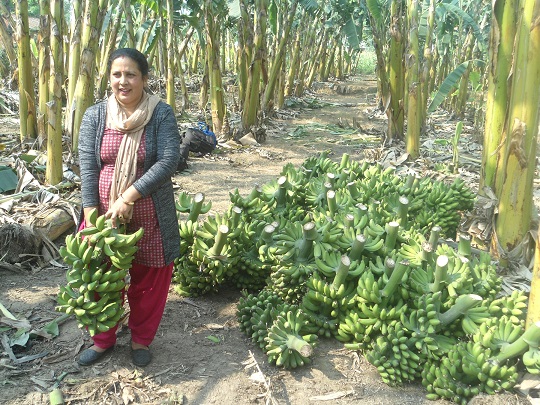Banana farming fetches Rs 150 million income annually in Parbat

Parbat / Dec 7: Farmers in the Gyadi area of Kushma municipality in Parbat district are making a handsome income from commercial banana farming.
As many as 65 farmers at Pipaltari and Katuwachaupari in the municipality have been doing commercial banana farming for seven years in 1,000 ropanis of land, replacing rice and millet farming.
Each farmer has cultivated banana plants across at least 5 to 10 ropanis on average and their income spans from Rs 50,000 to Rs 300 thousand per person annually from the sales of their produce.
Farmers took up banana plantations after they found it more lucrative than rice and millet farming, said Baburam Sharma, coordinator of the Gyadi Banana Block.
Banana seeds and saplings were first brought to Gyadi Area in 2052 BS from the Rapti river basin of Chitwan district for commercial farming. Since then banana farming has been the major source of income here.
The seeds were sown, and Banana Block under the Prime Minister Agriculture Modernization Project was extended in 2076 BS for commercial farming, according to Coordinator Sharma. The fusra variety of banana, known for having high disease resistance, is planted by the farmers.
Farmers have been receiving seedlings, tools, fertilizers and other technical assistance in subsidy from the Project, Sharma informed.
The products here are sold at Kushma, Cyclechowk, Phalebas, Maldhunga and Patichaur among other local markets and in the adjacent district Baglung.
The expansion of the road network to the village has aided in marketization, thereby promoting the trade of local produce including bananas, said banana farmer Deepak Subedi. The traders directly reach out to them and take their produce straight from the farmland.
In the wake of an exodus of youths, the lands left uncultivated are used for banana plantation, which has not only ensured regular income but also revived fertile soil, according to farmer Shovnath Lamichhane. A bunch of bananas has as many as 400 fingers.
In Lamichhane’s observation, most of the farmers in his village were attracted to banana plantations because they could be managed with few human resources and low investment. Each farmer has planted banana trees in the area up to 10 ropanis. RSS
